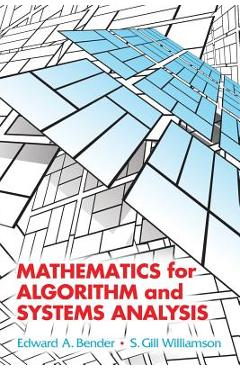Mathematics for Algorithm and Systems Analysis, Paperback/Edward A. Bender

Detalii Mathematics for Algorithm and Systems
elefant.ro
88.99 Lei
Foreign Books
Dover Publications
Mathematics for Algorithm and Systems - Disponibil la elefant.ro
Pe YEO găsești Mathematics for Algorithm and Systems de la Dover Publications, în categoria Foreign Books.
Indiferent de nevoile tale, Mathematics for Algorithm and Systems Analysis, Paperback/Edward A. Bender din categoria Foreign Books îți poate aduce un echilibru perfect între calitate și preț, cu avantaje practice și moderne.
Preț: 88.99 Lei
Caracteristicile produsului Mathematics for Algorithm and Systems
- Brand: Dover Publications
- Categoria: Foreign Books
- Magazin: elefant.ro
- Ultima actualizare: 12-02-2022 23:17:35
Comandă Mathematics for Algorithm and Systems Online, Simplu și Rapid
Prin intermediul platformei YEO, poți comanda Mathematics for Algorithm and Systems de la elefant.ro rapid și în siguranță. Bucură-te de o experiență de cumpărături online optimizată și descoperă cele mai bune oferte actualizate constant.
Descriere magazin:
Discrete mathematics is fundamental to computer science, and interesting, challenging problems in discrete mathematics arise in programming languages, computer architecture, networking, distributed systems, database systems, artificial intelligence, theoretical computer science, and elsewhere. This up-to-date text prepares undergraduates with four units of study: counting and listing, functions, decision trees and recursion, and basic concepts of graph theory. Each unit is divided into four sections, and each section contains a selection of problems that vary in difficulty. Solutions to these problems are given at the end of the text. Multiple-choice questions for review appear at the end of each unit. The text offers students the mathematical language and sophistication to recognize and articulate the ideas behind these questions and to answer questions similar in concept and difficulty. Those who master the necessary ideas and mathematical language to understand these review questions gain the ability to formulate, in the neutral language of mathematics, the problems that arise in various applications of computer science--a skill that enables them to discuss problems in discrete mathematics with other computer scientists and with mathematicians.

Produse asemănătoare

Mathematics for Algorithm and Systems Analysis - Edward A. Bender
![]() libris.ro
libris.ro
Actualizat in 28/10/2025
100.16 Lei
Produse marca Dover Publications

Be a Diamond: Decades of Dolly Parton\'s Style (an Unofficial Coloring Book) - Dover Publications
![]() libris.ro
libris.ro
Actualizat in 28/10/2025
89.23 Lei

Word Play: Write Your Own Crazy Comics #2, Paperback/Chuck Whelon
![]() elefant.ro
elefant.ro
Actualizat in 28/10/2025
43.99 Lei

A First Book of Haydn: With Downloadable Mp3s, Paperback/David Dutkanicz
![]() elefant.ro
elefant.ro
Actualizat in 28/10/2025
46.99 Lei


